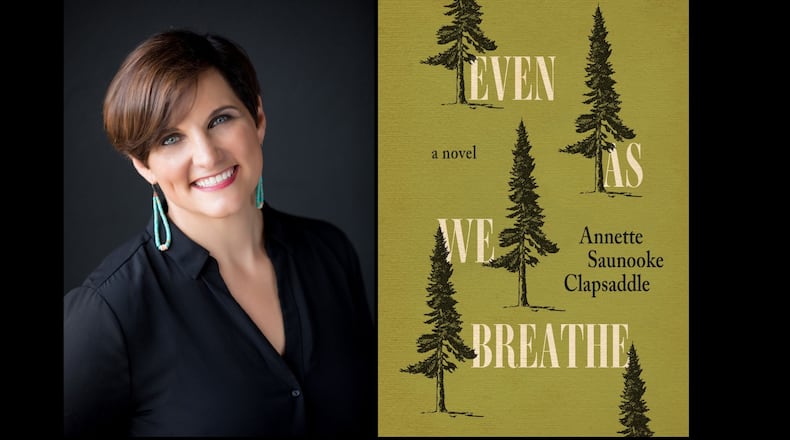In Annette Saunooke Clapsaddle’s debut novel, “Even As We Breathe,” 19-year-old Cowney Sequoyah, who has spent his whole life in the North Carolina reservation Qualla Boundary, is ready to forfeit certainty and strike out on his own. “Ever since I could remember, I wanted to escape Cherokee, and that feeling of suffocation just kept growing with my body.”
In the summer of 1942, a job opening at Grove Park Inn and Resort in Asheville becomes the portal for his escape. Cowney’s feelings about leaving home are complicated though. He worries about abandoning his beloved paternal grandmother, Lishie, who raised him after both of his parents died in his infancy. But he can’t wait to get away from Bud, his domineering uncle who teases him about his disability. “Bud always spoke like I had shied from the work, that I had refused to cut and hang tobacco or hoe the tater garden or milk old Bess. My disabled foot translated to disabled resolve in his book.”
The chance to work at the same place as Essie Stamper, his longtime crush, is what seals the deal for him. Among the many things Cowney adores about her is her steely confidence and self-possession. “How did she arrive with such assurance on her very first day when I was still too cautious to even enter the main building willingly?”
Cowney is lonely but loyal. He has few friends aside from Essie and a man named Tsa Tsi, who has a pet capuchin monkey. At Grove Park Inn, Cowney’s coworkers remind him that he is Indian and treat him like a second-class citizen. This comes as no surprise to Uncle Bud, who observes that Indians were not recognized as U.S. citizens until after World War I. Despite the harsh treatment he experiences, Cowney can’t be broken. He keeps his head down, continues the backbreaking work of hauling firewood, and somehow maintains his tender and sensitive demeanor.
In “Even As We Breathe,” Clapsaddle, an enrolled member of the Eastern Band of Cherokee Indians, weaves in an intriguing chapter in U.S. history. The “guests,” at Grove Park Inn are Axis foreign diplomats, foreign nationals and U.S. citizens being detained and held under surveillance while World War II rages on. Though they live in luxurious surroundings and are treated like royalty, they are, in fact, prisoners.
These guests get little sympathy from Cowney, who reserves his compassion for his own people and Japanese U.S. citizens who Cowney learns are imprisoned in internment camps on Indian reservations out west. “For once in their lives, those Japanese Americans must have wished they were just Japanese in America, like the diplomats and nationals that I’d be serving at the inn. Being American had somehow made being Japanese harder.”
Cowney is haunted by secrets both he and others keep. The circumstances surrounding his father’s death while serving during World War I are unknown. Early on in his stay at Grove Park Inn, Cowney discovers what he suspects is human bone buried in the earth. Instead of alerting the authorities, he hides it, a choice that will catch up to him and lead to dire consequences. And then there is the secret Cowney keeps from Essie — that he wants them to be more than just friends.
The Great Smoky Mountains make for a lush backdrop. Cherokee is “mud-chinked log cabins burrowed into mountain hollers, surprising expanses of neat garden rows jutting across rare unwooded land at the end of the roughly carved dirt road.” At his favorite waterfall, Cowney seeks solace, ponders his relationship with Essie and gets a much-needed break from Uncle Bud’s verbal outbursts.
The mysteries at the heart of “Even As We Breathe” are captivating. How did his father really die and who knows the whole truth about it? Why does Uncle Bud despise a fellow soldier he knew from the war? Who is setting the fires in Cherokee that threaten to turn Lishie’s home into ashes? “Even As We Breathe” is a poignant story about loss and home, how a person who has never known their parents finds a way to reckon with their roots and their history, and how the truth, no matter how painful it may be, can pave the way to peace.
If there is anything lacking in the novel, it is the friendship between Cowney and Essie. Cowney is quiet, complex and deeply drawn. Essie, though opinionated, feels flatter. They bond over their shared Cherokee heritage and love of dominoes, but they lack a deeper, more meaningful connection. Despite this shortcoming, Clapsaddle has painted an evocative world about a little-known event in history with a memorable character in Cowney.
Some of the most groundbreaking novels set in Appalachia have been released in the last few years. These include Mesha Maren’s “Sugar Run,” Carter Sickles' “The Prettiest Star,” and Julia Franks' “Over the Plain Houses.” They have succeeded in bursting through the stereotypes of the region and its people to forge fresh and original stories.
Clapsaddle’s “Even As We Breathe” belongs in this astute group and evokes a similar theme. Despite the hardships that lie between its peaks, the mountain range holds within it freedom, autonomy and the chance at life full of possibilities. “Those who know nothing of this land might see these empty remnants as proof of extinction,” concludes Cowney. “But those who know the stories of this place simply wait for them to wake from hibernation, thrumming their return in unified song.”
FICTION
By Annette Saunooke Clapsaddle
University Press of Kentucky
240 pages, $24.95
About the Author
Keep Reading
The Latest
Featured


